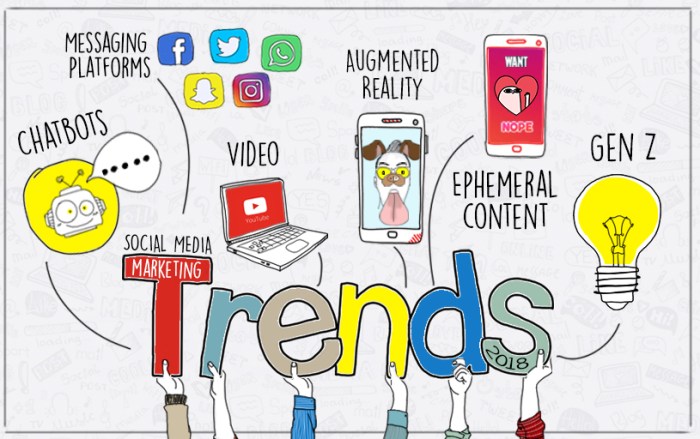Social Media Trends are constantly evolving, shaping the way we interact online. From influencer marketing to video content and social commerce, these trends have a significant impact on our digital landscape.
Let’s dive into the top trends of 2021 and explore how emerging technologies are influencing the future of social media.
Current Social Media Trends
Social media trends in 2021 continue to evolve rapidly, shaping the way we connect, consume content, and interact online. With the ongoing advancements in technology, it’s essential to stay updated on the latest trends to remain relevant in the digital landscape.
Short-form Video Content Dominance
Short-form video content, popularized by platforms like TikTok and Instagram Reels, has taken center stage in 2021. Brands and creators are leveraging these platforms to engage with their audience in a more authentic and creative way.
Live Streaming on Social Media
Live streaming has gained significant traction, providing a real-time and interactive experience for users. Platforms like Facebook Live, Instagram Live, and Twitch have become go-to destinations for live content, fostering a sense of community and immediacy.
Ephemeral Content on Stories
Ephemeral content, such as Instagram Stories and Snapchat, continues to be a popular trend in 2021. Users are drawn to the temporary nature of these posts, creating a sense of urgency and FOMO (fear of missing out) among followers.
Augmented Reality (AR) Filters and Effects
AR filters and effects have become a staple in social media platforms, allowing users to enhance their photos and videos with interactive elements. Brands are also utilizing AR technology to create immersive experiences for their audience.
Social Commerce Integration
Social commerce has seen a surge in 2021, with platforms like Instagram and Facebook integrating shopping features directly into their apps. This seamless shopping experience has revolutionized the way consumers discover and purchase products online.
Privacy and Data Security Concerns
Amidst the evolving social media landscape, privacy and data security have become major concerns for users. Platforms are under scrutiny to enhance their privacy policies and security measures to build trust and transparency with their audience.
Influencer Marketing: Social Media Trends
Influencer marketing plays a significant role in shaping social media trends by leveraging the influence and credibility of individuals with a large following to promote products, services, or brands to their audience. These influencers have the power to sway consumer behavior, drive engagement, and increase brand awareness in a more authentic and relatable way compared to traditional advertising methods.
Successful Influencer Marketing Campaigns
- One successful influencer marketing campaign was the collaboration between Daniel Wellington, a watch company, and various fashion and lifestyle influencers on Instagram. These influencers posted stylish photos featuring the brand’s watches, resulting in a significant boost in sales and brand visibility.
- The partnership between Gymshark, a fitness apparel brand, and fitness influencers on YouTube and TikTok also proved to be highly successful. These influencers created workout videos wearing Gymshark’s products, leading to a surge in brand engagement and customer acquisition.
Challenges and Ethical Considerations
- One of the challenges of influencer marketing is ensuring transparency and disclosure of sponsored content. Influencers must clearly indicate when they are being paid to promote a product or service to maintain credibility and trust with their followers.
- Another ethical consideration is the authenticity of influencer endorsements. It is essential for influencers to genuinely believe in the products they promote to avoid misleading their audience and preserve their reputation in the long run.
- Additionally, brands need to carefully select influencers whose values align with their own to avoid potential backlash or controversy that could damage their reputation and brand image.
Video Content

Video content has become one of the most popular forms of media on social media platforms. With the rise of platforms like YouTube, TikTok, Instagram, and Facebook, users are consuming video content more than ever before.
Rise of Short-Form Video Content, Social Media Trends
Short-form video content, such as TikTok videos and Instagram Reels, has taken the social media world by storm. These bite-sized videos are easy to consume and share, making them highly engaging for users. The short attention span of today’s audience has also contributed to the popularity of short-form video content.
- Short-form videos are more likely to go viral due to their shareability and entertainment value.
- Brands and influencers are leveraging short-form video content to reach a wider audience and increase engagement.
- The success of platforms like TikTok has paved the way for other social media platforms to incorporate short-form video features.
Effectiveness of Live Streaming
Live streaming has become a powerful tool for brands and influencers to connect with their audience in real-time. Platforms like Instagram Live, Facebook Live, and Twitch have made it easier than ever to go live and engage with followers.
Live streaming allows for authentic and unfiltered interactions, creating a sense of immediacy and connection with viewers.
- Live streaming is a great way to showcase behind-the-scenes content, conduct Q&A sessions, launch products, and host events.
- Brands can use live streaming to humanize their brand and build trust with their audience.
- Engagement rates are typically higher during live streams compared to pre-recorded videos, as viewers feel more involved in the experience.
Social Commerce

Social commerce refers to the use of social media platforms to facilitate online shopping and selling of products or services. It integrates social interactions and e-commerce, allowing users to discover, share, and purchase items directly within the social media environment. In the current social media landscape, social commerce has become increasingly popular as brands look for new ways to engage with customers and drive sales.
Examples of Brands Leveraging Social Commerce
- Instagram’s Shopping feature enables users to browse and purchase products directly from posts and stories, making the shopping experience seamless and convenient.
- TikTok’s partnership with Shopify allows merchants to create and run campaigns on the platform, driving traffic to their online stores and increasing sales.
- Facebook Marketplace provides a platform for individuals and businesses to buy and sell items locally, leveraging social connections to facilitate transactions.
The Future of Social Commerce
Social commerce is expected to continue growing in importance, with more brands and platforms embracing this trend. The rise of live shopping, augmented reality try-on experiences, and social media influencers driving sales are all indicators of the potential impact of social commerce on e-commerce. As technology advances and consumer behaviors evolve, social commerce is likely to play a significant role in shaping the future of online shopping.












